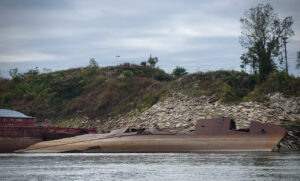
The wreck of the ‘USS Inaugural,’ October 21, 2021
Every few years the Mississippi at St. Louis drops enough to reveal the wreck of a WWII minesweeper, the USS Inaugural, lying in a few feet of water, next to the Missouri shore. How it came to be there is a strange story, well worth reading. The River is relatively low now, so the ship has emerged again after three years, and my younger son and I drove over to see it today.
When I was younger than he is now, my mother took me down to the River near Grand Tower, after a flood. A barge that seemed as big as our house had broken loose from a tug or mooring and was stuck at a weird angle in the mud onshore after the water receded. We walked right up to it, and I touched the rusty hull. It was a seminal experience of my childhood to witness how the barge, a manmade colossus, had been thrown about by nature like a child’s toy, and how all those forces rested together in silence after the flood. It sensitized me at an early age to the philosophical sublime.
Back then, the Inaugural was moored at the foot of the Gateway Arch as a tourist attraction, and my mom took me to see her too. It was my first time on a naval vessel. I can remember the stink of oil, how steep the ladders (stairs) were, and how there was nothing soft aboard. The experience probably helped me decide to go in the Army, not the Navy, when the time came, but a decade later I would bob around in the Gulf anyway on a different class of minesweeper, converted for diving operations, as a trainee at the Naval Diving and Salvage Training Center.
I have dived on several shipwrecks since then, and each was different. One was a tangled, incoherent mess; one was romantic in the way of decrepit architecture in former colonial capitals. One flexed its broken back in the surge, so the deck plates opened and closed like pincers the size of an apartment building.
What shipwrecks have in common is that they are always humbling, as Shelley seems to have had in mind when writing about the statue in his “Ozymandias,” in its sea of desert:
“Look on my Works, ye Mighty, and despair!
Nothing beside remains. Round the decay
Of that colossal Wreck, boundless and bare
The lone and level sands stretch far away.”

Graffiti on flood wall at St. Louis. Photo by John Griswold
My son and I had to drive down several bankside streets before we could get past the industrial complexes and rail lines clogged with rolling stock. An enormous flood wall keeps the river in its bed, and only one gate was open. We walked through it, past the garbage and sand dunes, to a large concrete pad with no guard rails, 40 feet over the river, and from there I could see the bow of the Inaugural about a hundred yards upstream, next to some barges.
She was lying on her port side, and from that angle it looked as if her entire superstructure was missing. She could have been any rusted, riverine junk. Low water reveals many wrecks; most are left to rot in place, as long as they do not block the channel. The riverbed is littered with such disasters. As a shipwreck, the Inaugural is unsalvageable and offers up little emotion, the way that roadkill becomes less disturbing the flatter and less recognizable it gets, other than the humbling feeling of loss in something that took a mountain of resources and labor to build, and which survived serving our country in war.
I spoke with a fisherman on his last day bank-fishing for the year—“Water’s getting too chilly,” he said, though he would miss the cats and drums—and to some men backing a large boat trailer down a ramp under the MacArthur Bridge. One of them took photos of the Inaugural from midriver for me and kindly sent them later.
Firefighters rescued two adults from a 44-foot pleasure boat that ran aground on the low-water dam upstream at Chain of Rocks on October 5, and the craft is still there, stuck at a weird angle, being pounded by the current like a toy boat in the bath.
